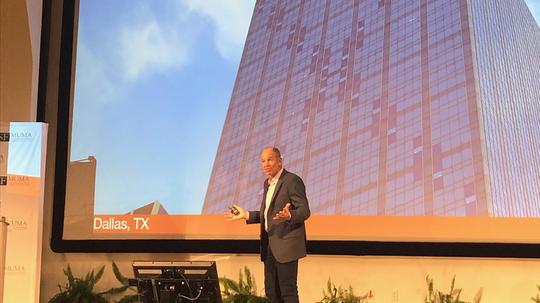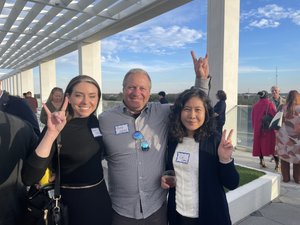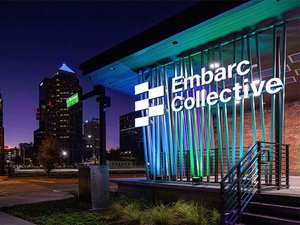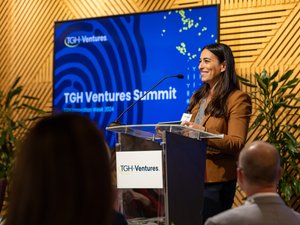
Marc Randolph believes being an entrepreneur is like practicing the piano. Or ordering off the menu without knowing what will come out. And that planting an idea is like planting a tree.
The analogies, amidst a few "Netflix and chill" jokes, were amongst a slew of advice Netflix co-founder Randolph gave to a crowd at the University of South Florida's second annual Thought Leader series. The series, for only being 2 years old, has brought in some of the biggest names in the tech industry: last year, Apple co-founder Steve Wozniak took the stage.
Randolph detailed the conception of the Netflix idea (hint: it was during carpooling with fellow co-founder Reed Hastings), what he believes some of the trends in the tech industry are and advice for entrepreneurs. Read more below:
You don't need to be in Silicon Valley
"I would say you don’t need to be in the Bay Area, but that has a different meaning here," Randolph said to applause from the crowd. "Buenos Aires, Seoul; the internet has democratized everything. Innovation can happen everywhere."
You don't need special skills — or really, even to be smart
"Some of the best were not the 'A' students or 'B' students," he said. "All of you know this because you know what it's like. You know in high school, you have pressure to get the top grades and in college to get the right the grades. And unfortunately, unless you're careful, you leave school with all the risk-taking squeezed out of you."
Have a tolerance for risk
"Not something scary," Randolph said, motioning to a photo of a person overlooking a cliff. "But striking down a trail without seeing what's around the corner. Ordering off the menu without knowing what comes out. You have to be willing to start before you know where the path leads. If you wait until you see every twist and turn, you’ll be too late."
Have an idea — but not just one
The idea of Netflix didn't come from Randolph and his company partner walking into a video store, but instead spitballing hundreds of ideas during their 45 minute carpooled commute to work each day.
"At the end of the day, I would debrief him with what I learned and we did this with hundreds of ideas," he said. "We noticed the half life of an idea was really short: 24 hours. What it means is if you start off Monday morning and have 16 great ideas in a single day of testing them out, half will go away by Wednesday. Then you're down to four and by Thursday, two are left and if you're lucky, by Friday, maybe one idea is viable. But one of the ideas that came out of this process is video rental by mail."
Many of the best ideas, he said, are not to solve huge problems but to solve the simple, every day ones that still cause pain.
"Mark Zuckerburg just wanted to meet girls and that led to Facebook," Randolph said. "It doesn’t even need to be a new idea. People have been selling books since the printing press, but think of the innovation with this bookstore, which is Amazon. And think of the innovation we’ve seen in this space with Uber and Lyft. It doesn’t need to be a complicated idea — the Post-it is a piece of paper, but it comes in different sizes, colors, fragrances and it sells a billion a year."
Instead of testing a whole idea, try "validation hacking"
"The insight is, it's not about having good ideas," he said. "It was about building a system, process and culture to come test lots of bad ideas. Success is proportionate to how many ideas you can test. Those are proportionate to how quickly, cheaply and easily to how you can test them."
Randolph gave an example of one entrepreneur he knew who printed up business cards and passed them out to potential customers, without actually having created the business t see if there would be an actual demand.
"You have to try something without actually doing it," he said. "By colliding ideas with reality, he discovered quickly and cheaply it wouldn’t work and he began learning about doing it without doing it. Netflix was validation hacking too."
The most important thing, in Randolph's opinion, isn't funding, talent or even a great idea: it's having confidence in that idea.
"Believe that 'Yes, I am going to figure this out,'" he said. "Some of the best advice is don’t fall in love with the idea, fall in love with the problem. Know it, love it and believe you can solve it. When you get that idea and run into the dorm and tell friends, or tell your board, or employees and they’ll say it’ll never work, the truth is most of the time they’ll be right. But you have to believe 'not this time.' If I can stumble into this, anyone can do it."









